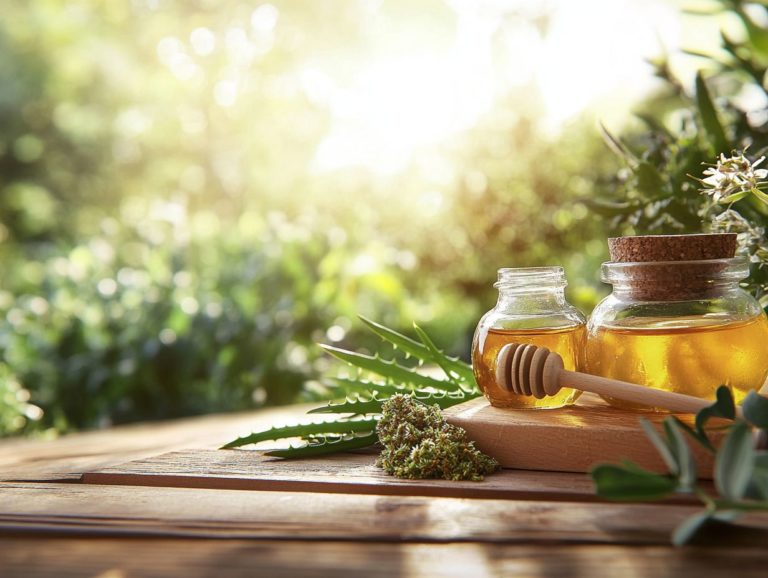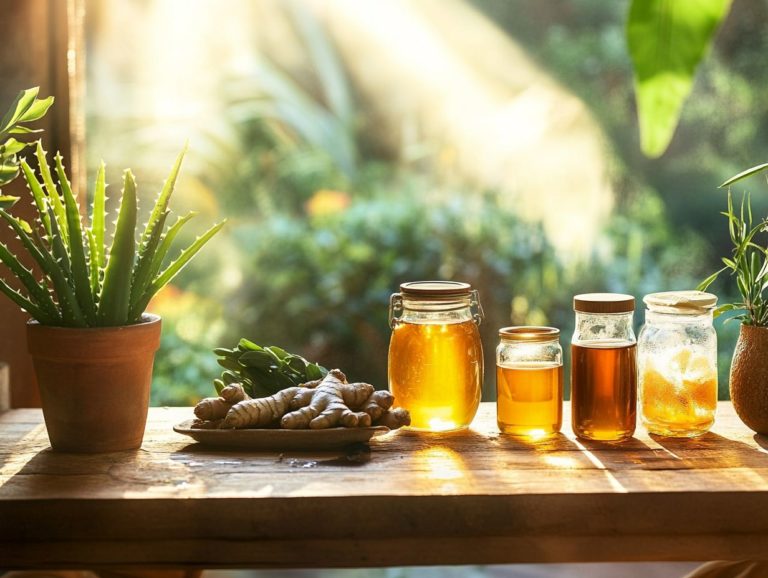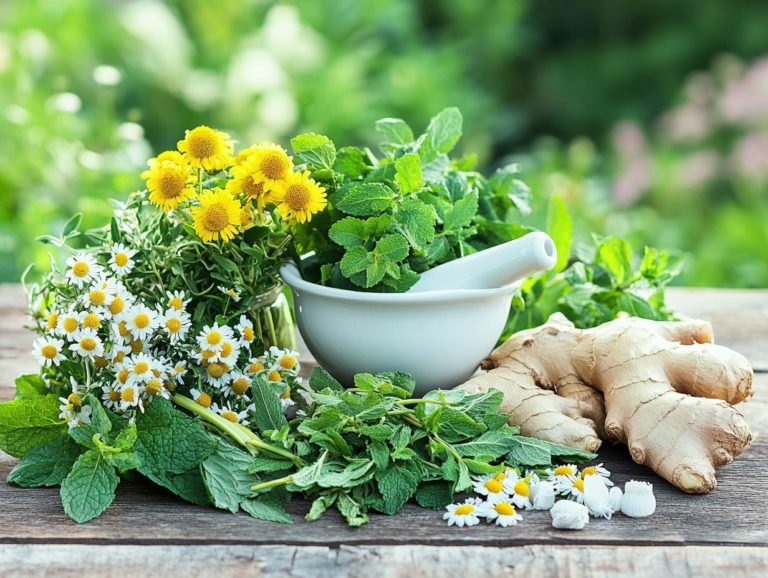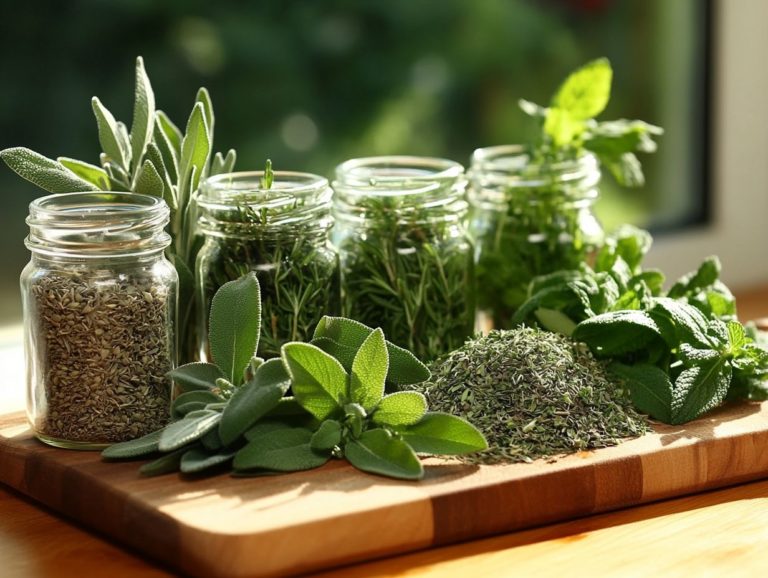Herbal Solutions for Managing Fever
Fever is a key sign that your body is responding to infection. Recognizing it typically means your temperature is above 98.6 F (37 C).
This article delves into a variety of herbal remedies that have stood the test of time, offering relief from fever symptoms and helping to soothe discomfort during illness. From traditional herbs to contemporary supplements, you ll uncover effective strategies suitable for both adults and children.
Understanding when to seek medical assistance is equally crucial, as is enhancing immunity through herbal support. It s crucial to know when to call a healthcare professional, especially if symptoms escalate.
Contents
- Key Takeaways:
- Understanding Fever
- Traditional Herbal Remedies for Fever
- Modern Herbal Approaches for Fever
- Combining Herbal and Medical Approaches
- Preventing Fever with Herbs
- Using Herbs for Fever in Children
- Frequently Asked Questions
- 1. Can herbal solutions really help manage fever?
- 2. What are some common herbal solutions used for managing fever, and can they help soothe discomfort?
- 3. Are herbal solutions safe for children with fever?
- 4. Can herbal solutions be used alongside conventional fever medication?
- 5. How long does it take for herbal solutions to work on fever?
- 6. Are there any side effects of using herbal solutions for managing fever?
Key Takeaways:
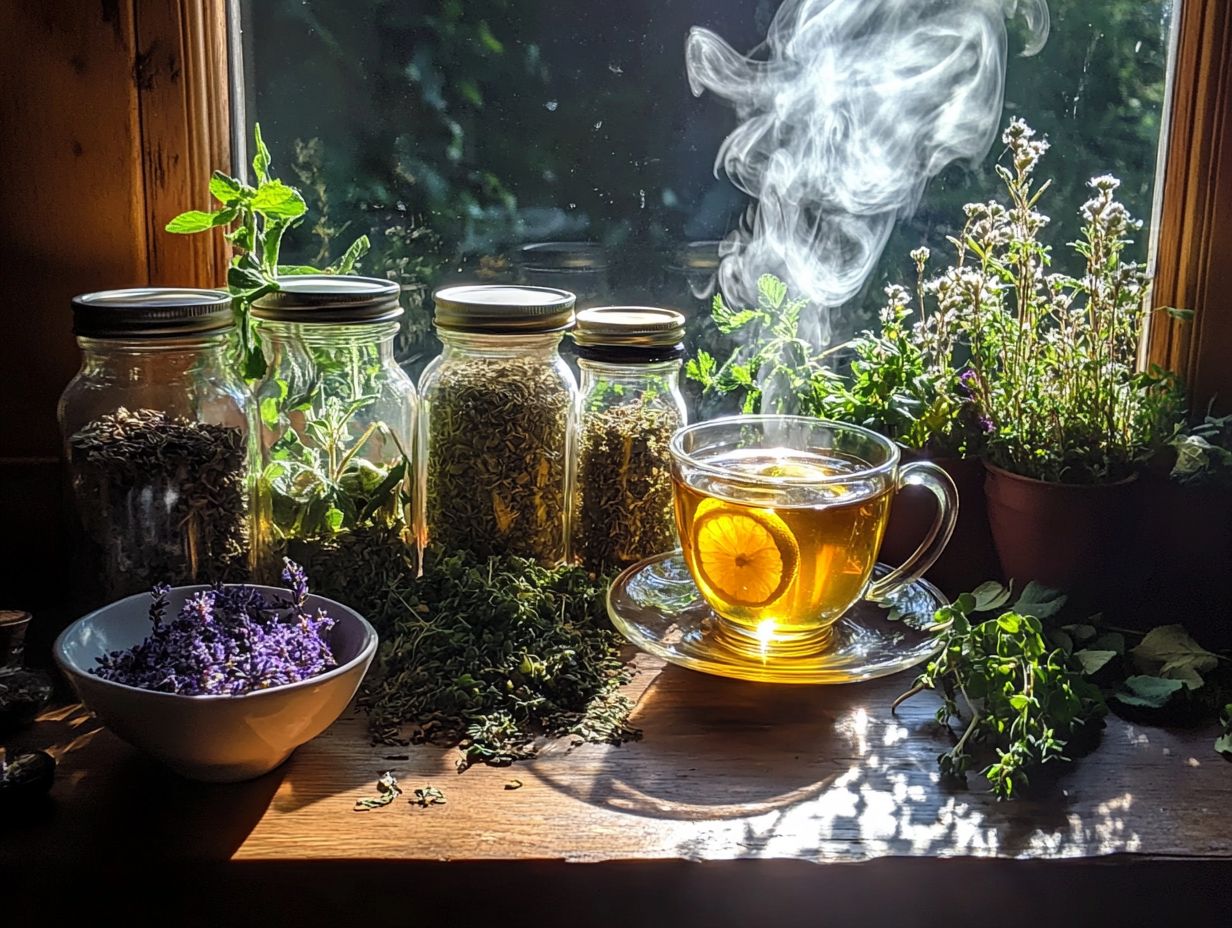
- Herbal remedies can help manage fever, but it’s important to understand the cause and seek medical help if necessary.
- Common herbs for fever relief include ginger, echinacea, and elderberry, which help lower body temperature and boost your immune system.
- Boosting immunity with herbs can help prevent fevers and other illnesses, which is essential for overall health.
Understanding Fever
Fever acts as a critical indicator of your body’s response to infection. This elevated temperature often signals that your immune system is actively engaged in battling harmful bacteria and viruses.
Therefore, it is vital for you to monitor and comprehend the causes and implications of fever to manage symptoms effectively.
What is Fever?
Fever is defined as an increase in body temperature, typically exceeding 98.6 F (37 C), recognized as a common response to infection.
This physiological change occurs when the part of your brain that controls temperature adjusts your body’s temperature set point in reaction to pathogens.
True fever differs from other temperature elevations, such as hyperthermia or fluctuations caused by external factors.
When your body detects invading bacteria or viruses, it triggers an immune response, raising your temperature to create an inhospitable environment for these invaders. This elevated state enhances various immune functions and speeds up metabolic processes, helping your body mobilize defenses, like white blood cells, to combat the infection more efficiently.
Thus, fever serves as a crucial indicator that your immune system is engaged and actively working to restore your health.
Traditional Herbal Remedies for Fever
Traditional herbal remedies have been cherished for centuries across many cultures as effective methods for managing fever and boosting the immune system.
These trusted remedies provide a natural way to fight fever and promote wellness!
Common Herbs Used for Fever Management
Common herbs for managing fever are elderflower, yarrow, and peppermint, each celebrated for their ability to support your body during illness.
Elderflower, with its diuretic properties, encourages sweating, a natural process that can help reduce fever. Yarrow has been valued in traditional medicine for centuries; it contains compounds that promote circulation and may assist in regulating your body temperature. On the other hand, peppermint provides a refreshing cooling effect that can ease the discomfort associated with fevers. For those dealing with coughs or throat irritation, exploring herbal solutions may also offer relief.
Scientific studies confirm that these herbs not only boast anti-inflammatory properties but also stimulate your immune system, enhancing your body’s ability to effectively combat infections.
The historical usage of these herbs reflects a deep respect for their healing capabilities, with cultures around the world relying on them as natural remedies in times of sickness.
Modern Herbal Approaches for Fever
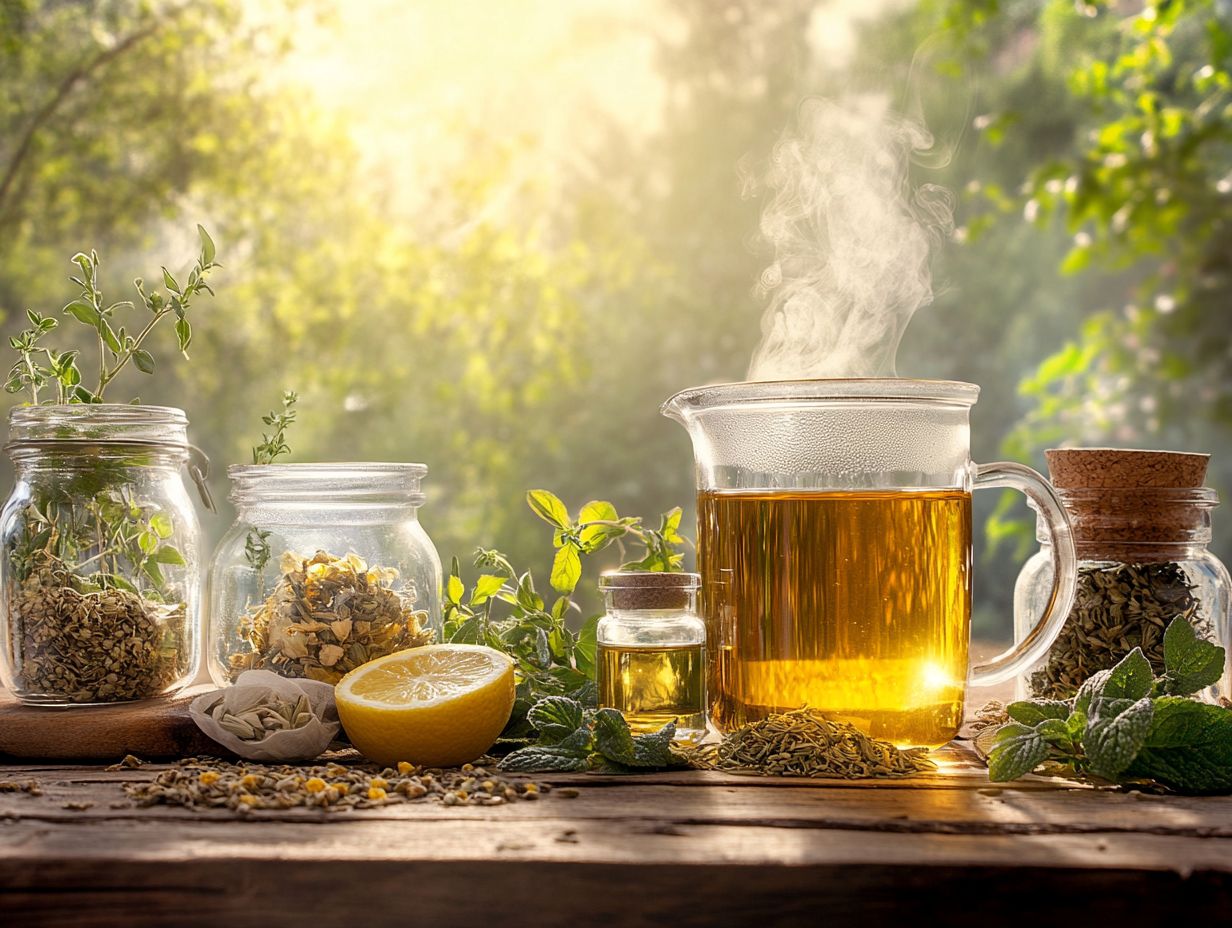
Modern herbal approaches to fever seamlessly blend traditional wisdom with contemporary practices. This presents you with a diverse array of supplements and teas designed to manage fever symptoms effectively.
Try these herbal remedies and start feeling better today!
Herbal Supplements and Teas for Fever Relief
Herbal supplements and teas like ginger, echinacea, and chamomile can help relieve fever. They harness the body s natural immune response.
These natural remedies have properties that reduce inflammation and fight oxidative stress, potentially helping to lower fever and enhance overall wellness.
For instance, ginger is celebrated for its warming effects. You can make a soothing tea by steeping fresh ginger slices in hot water. A daily dosage of 1-2 grams of fresh ginger may provide noticeable relief.
Echinacea is often enjoyed as a tincture or tea. It is thought to bolster immune function, with dosages typically ranging from 300-500 mg of extract for maximum effectiveness.
Chamomile tea not only promotes relaxation but may also help reduce inflammation.
While anecdotal evidence supports these benefits, exciting scientific studies are diving into how effective these remedies really are, highlighting the potential of herbal solutions for managing fever.
Combining Herbal and Medical Approaches
You can create a more holistic treatment plan by blending herbal remedies with modern medical approaches to fever management. This ensures traditional wisdom and scientific advancements work together for optimal care.
When to Seek Medical Help
Recognizing when to seek medical help for a fever is essential. Watch for symptoms like severe headaches, difficulty breathing, persistent vomiting, or any unusual signs that could indicate a more serious underlying condition.
If you experience a rapid heart rate, confusion, or a high fever lasting more than three days, these are red flags that demand immediate attention!
For very young children, a high fever can trigger febrile seizures, which require prompt medical attention.
When you communicate with your healthcare provider, be sure to clearly articulate your symptoms. Include their duration, intensity, and any relevant medical history. This can significantly speed up receiving appropriate care, especially during emergencies involving prolonged or severe fever.
Preventing Fever with Herbs
Preventing fever with herbs requires targeted strategies that boost your immunity and strengthen your body’s defenses against harmful pathogens.
By integrating these natural remedies into your routine, you can cultivate a stronger, more resilient system that actively resists illness.
Powerful Herbs to Boost Your Immunity!
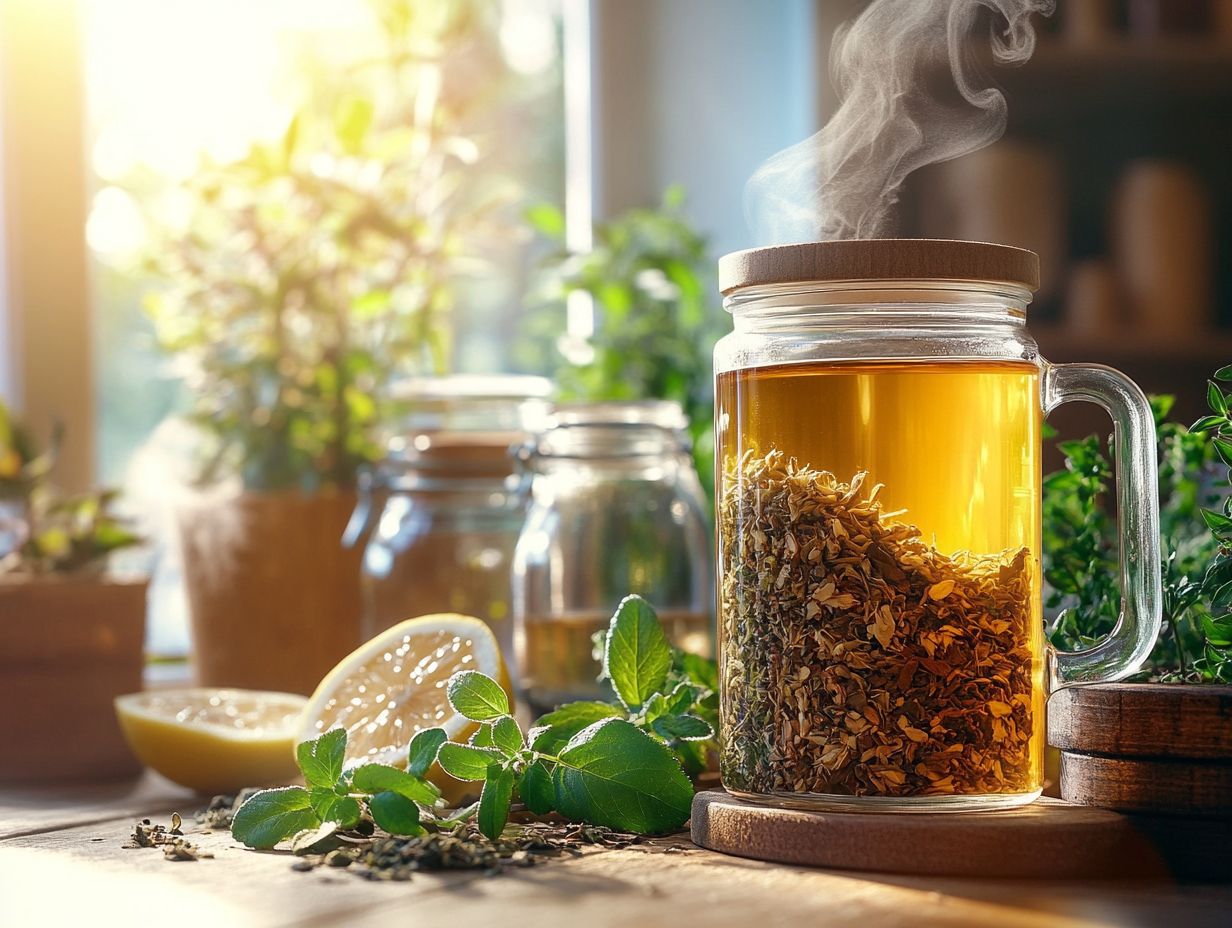
Herbal strategies for boosting your immunity can be quite effective. Consider incorporating vitamin C-rich herbs, moringa, and kudzu root into your routine. These powerful botanicals can significantly enhance your body’s defense mechanisms.
Integrating these herbs into your daily life can yield remarkable benefits. Pair them with lifestyle changes like drinking plenty of fluids and staying hydrated.
For example, moringa is celebrated for its impressive nutrient profile. You can enjoy it as a tea or blend it into smoothies. A typical dosage is one to two teaspoons of the dried leaf powder each day.
Kudzu root is also versatile it can be taken in capsule form or as a tincture, typically at 300 to 500 mg.
Scientific studies support these practices, revealing that moringa’s antioxidant properties and kudzu’s ability to modulate immune function can play a crucial role in fortifying your body against infections and fever. This makes them critical allies in your herbal health management journey.
Using Herbs for Fever in Children
When it comes to using herbs for fever in children, always consider safety and effectiveness. Children’s bodies can react quite differently to herbal remedies, so it’s essential to ensure that any treatment you choose is suitable for their unique needs.
Safe and Effective Herbal Options for Kids
Safe and effective herbal options for managing fever in kids include chamomile tea and ginger. Both are renowned for their gentle properties and ability to soothe discomfort.
These herbal remedies provide relief and carry a calming reputation, making them especially beneficial during stressful times for children and parents. Many love chamomile tea for its gentle taste, and it can be easily prepared by steeping a tea bag or dried flowers in hot water. For more information, consider using herbal solutions for cold and flu symptoms. To ensure safety, it’s crucial to use age-appropriate amounts to avoid any allergic reactions.
Ginger, celebrated for its warming effects, can be grated and added to warm water or mixed into food. Just be mindful, as its potency can vary. While both options are generally safe, always check with your healthcare provider to keep your child safe before introducing any new herbal treatments.
Frequently Asked Questions
1. Can herbal solutions really help manage fever?
Yes, some herbs can help lower fevers. However, it is important to consult with a healthcare professional before trying any herbal remedies.
2. What are some common herbal solutions used for managing fever, and can they help soothe discomfort?
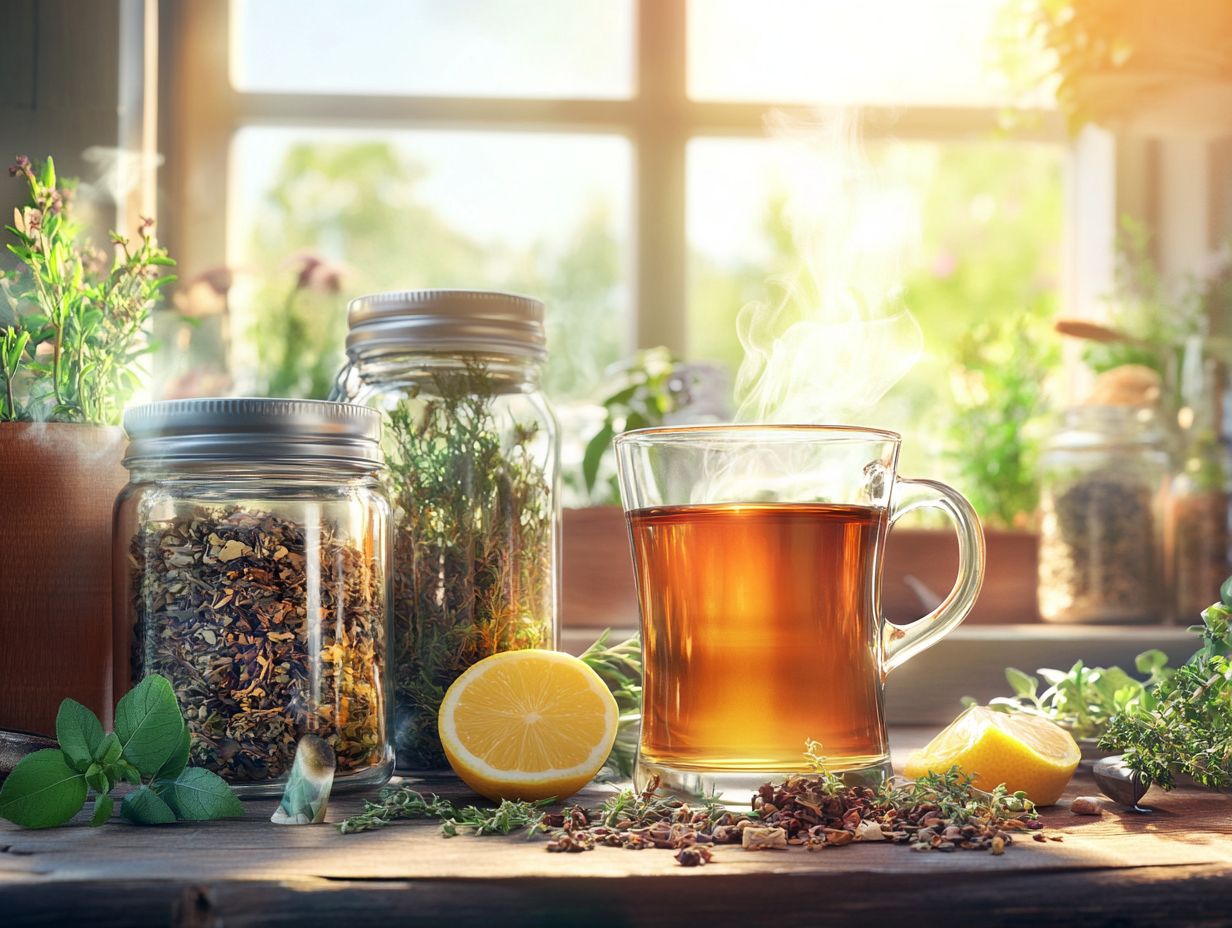
Ginger, garlic, elderberry, and turmeric are some of the most commonly used herbal solutions for managing fever. These herbs have been traditionally used for their anti-inflammatory and immune-boosting properties.
3. Are herbal solutions safe for children with fever?
It is best to consult with a pediatrician before giving any herbal remedies to children. Some herbs may not be suitable, and the dosage might need adjustment.
4. Can herbal solutions be used alongside conventional fever medication?
Yes, in most cases, herbal solutions can safely accompany conventional fever medication. However, it is essential to consult with a healthcare professional and inform them about all the medications and herbs you are using.
5. How long does it take for herbal solutions to work on fever?
The effectiveness of herbal solutions for managing fever can vary from person to person. Sometimes the effects may be immediate, while in other cases, it may take a few days. Monitor your symptoms and consult a healthcare professional if they persist.
6. Are there any side effects of using herbal solutions for managing fever?
Like any medication or remedy, herbal solutions may have potential side effects. Some herbs may interact with specific medications or may not be suitable for people with certain medical conditions. Always check with a healthcare professional before using any herbal remedies for managing fever.

